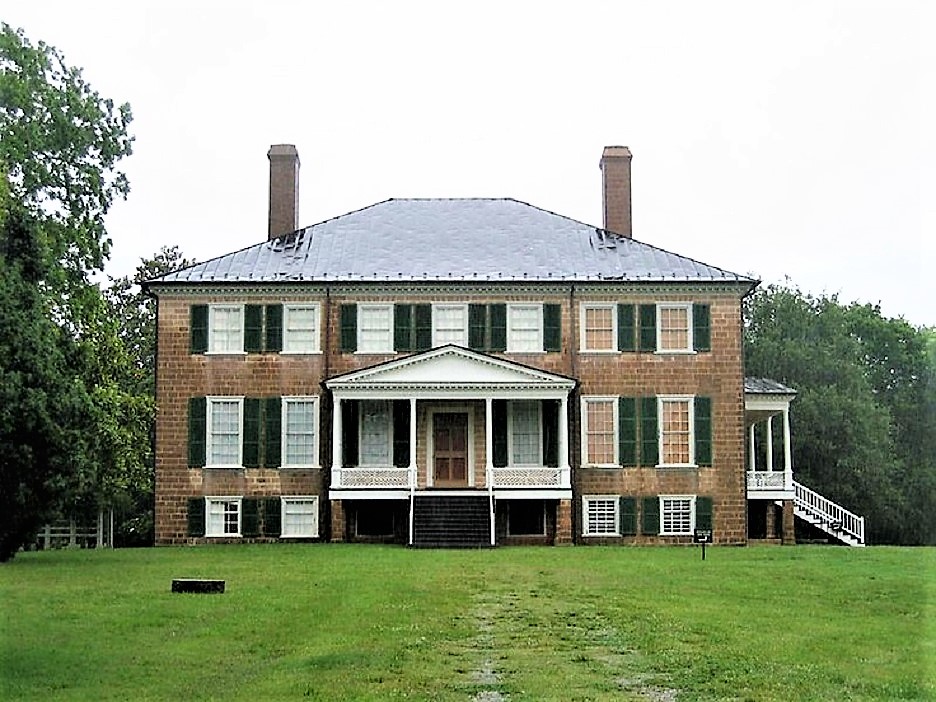Prestwould, Clarksville, Virginia. In 1788, Jean married English-born Sir Peyton Skipwith (1740-1805) of Mecklenburg County, VA. Skipwith, one of the wealthiest men in Virginia, had previously been married to Jean's sister Anne (1742/3-1779). Lady Jean gave birth to 4 children in 5 years (all after the age of 40). By 1797 she moved her family from Elm Hill to her husband's new plantation, Prestwould, which still stands. Detailed records of household purchases and garden notes (not to mention her library records) reveal Lady Jean's varied interests. Following her husband's death in 1805, Lady Jean remained at Prestwould until she died in 1826, aged 78.
Sitting high above the merger of the Dan and Stanton Rivers in Virginia, is the family house of Sir Peyton Skipwith Built by slave labor in 1794, in a Georgian style, Prestwould Plantation remains one of the most complete gentry homes in Virginia. When the house was built, the countryside surrounding it was still a frontier. Stone walls and metal gates surround the lawn. Some original outbuildings and Lady Jean's Garden remain. An original two-family slave house still stands on the property.
Lady Jean not only ran the plantation after her husband's death, but also maintained extensive records of her gardening activities -- what she grew in her gardens, as well as local native plants found on the property. She had a large garden that was based on the traditional English design, but she placed it to the East of the entrance to the house, so that it had a position of prominence and announced to visitors that the gardens were important at Prestwould. She designed terraced garden beds falling toward the family cemetery.
Lady Jean's gardening records indicate that she found & used numerous Native American plants, such as columbines, bloodroot, Solomon's seal, fire pinks, blue eyed grass, monk's hood, butterflyweed, spring beauty, and Virginia bluebells in her gardens. She also planted Helleborus foetidus, candy tuft, rose of sharon, lantana, mock orange, lilacs, French marigolds, and Lady Banks roses. French marigolds were all the rage in 1791, when they were featured in William Curtis' Botanical Magazine, and Lady Jean accurately described them as "Striped French Marigold" in her records.
Lady Jean's Garden House. In an 1805 letter to St. George Tucker, Lady Jean's daughter described her mother's gardens: "A spacious, fine garden, to the cultivation of which she is totally devoted -- if you are fond of gardening of flowers and shrubs, as well as fine vegetables, you would delight to see her garden..."
Jean Skipwith's library is one of the very few known southern women's libraries from the colonial period, and is certainly the largest collection assembled by a Virginia woman. Although little is known of Jean Skipwith's education, her passion for gardens and books is obvious. Numerous invoices, lists and inventories, most contained in the Skipwith Family Papers in the library of the College of William and Mary, have allowed the library to be outlined in great detail.
A bibliography of the collection can be found in Mildred K. Abraham, "The Library of Lady Jean Skipwith: A Book Collection from the Age of Jefferson." The Virginia Magazine of History and Biography 91:3 (July, 1983), pp. 296-347. The records included here are those from that bibliography, which have been updated where possible and necessary. Abraham identified three major phases of book collecting: from 1781 - 1788, mostly in Liverpool and Scotland before her return to Virginia; from 1788 - 1805, the years of her married life; and from 1806 - 1826, her busiest collecting period.
During her years in Virginia, Skipwith continued to buy books from London, but also ordered widely from dealers in Petersburg, Richmond, Raleigh, Philadelphia, and elsewhere. At her death, Skipwith bequeathed several books to certain individuals, while willing her two daughters and daughter-in-law "two hundred volumes each to be selected alternately out of the books I died possessed of."
Her books included...
Traveling memorandums, made in a tour upon the continent of Europe, in the years 1786, 87, & 88 by Lord Francis Garden Gardenstone
The gardeners dictionary containing the best and newest methods of cultivating and improving the kitchen, fruit, flower garden, and nursery; ... The eighth edition, revised and altered according to the latest system of botany by Philip Miller
Artaxerxes: An English opera : as it is performed at...Covent-Garden by Thomas Augustine Arne
The experienced English house-keeper : for the use and ease of ladies, house-keepers, cooks, &c. : wrote purely from practice and dedicated to the Hon. Lady Elizabeth Warburton ... : consisting of near 800 original receipts, most of which never appeared in print by Elizabeth Raffald
For more Legacy Libraries go to Library Thing.
Her books included...
Traveling memorandums, made in a tour upon the continent of Europe, in the years 1786, 87, & 88 by Lord Francis Garden Gardenstone
The gardeners dictionary containing the best and newest methods of cultivating and improving the kitchen, fruit, flower garden, and nursery; ... The eighth edition, revised and altered according to the latest system of botany by Philip Miller
Artaxerxes: An English opera : as it is performed at...Covent-Garden by Thomas Augustine Arne
The experienced English house-keeper : for the use and ease of ladies, house-keepers, cooks, &c. : wrote purely from practice and dedicated to the Hon. Lady Elizabeth Warburton ... : consisting of near 800 original receipts, most of which never appeared in print by Elizabeth Raffald
For more Legacy Libraries go to Library Thing.






